Reading, Writing and Reinvention in Granada, Nicaragua
To take a line from his own newsletter, Nica Nuggets, for and about the expats of Granada, Nicaragua, Darrell Bushnell is as busy as a one-legged rooster in a three-story hen house. Jet Metier talks to the man who mesmerizes her with his tales of his life in the land of fresh water sharks and steaming volcanoes. 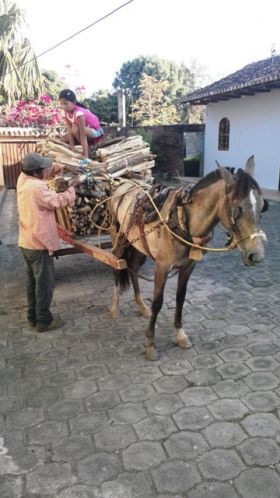

Jet Metier: How are you Darrell? How are Amy and the dogs? I like to think of you starting the morning doing something wonderful and unique in your neighborhood. Tell me, how has your morning gone? Did you take the dogs for a walk to the lake?
Darrell Bushnell: Well, not to the lake, but usually a ten block walk around Granada. It has been a great morning so far.
Jet Metier: For those of us who have only have a vague idea of what a neighborhood in colonial Nicaragua looks like, please describe (in your inimitable way) what you saw in those ten blocks and what you encountered.
Darrell Bushnell: The sun comes up around 5:00 am so we are usually into the walk already. The women of the neighborhood are out washing and scrubbing their sidewalks, many of their young daughters learning to emulate their mothers, sometimes with smaller brooms and mops.
Many of the neighbors are just opening their doors so we greet each other. And I always loved the greeting, “Como amaneciste,” which means “How did the dawn greet you?”
Going by one of the bodegas (warehouses), the men are getting out their carts to roll down to the central park. These carts are either food carts or souvenir carts used for selling to the locals and tourists. The rest of the walk is usually greeting the many cuidadors (caretakers) who are just finishing their night shift of watching the various properties. Upon seeing me, they know their shift is about over, since few have watches, though the rising sun gives them a hint of the time.
Jet Metier: You write beautifully and vividly, Darrell. There is so much that you express. I think that your newsletter should be bookmarked for anyone who wants to read an example of good personal reportage from abroad. Who did you read as a kid?
Darrell Bushnell: I started with the Tom Swift adventures, then the famous Lensman series from Doc Smith, though Mom always read to us as children, which started with Brighty of the Grand Canyon.
Jet Metier: I shall put those children’s books on my book list. I have never heard of Doc Smith. What translated authors do you recommend?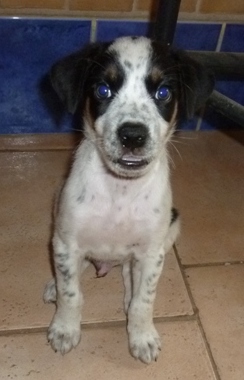

Darrell Bushnell: I'm not aware if those previous books are available in Spanish, though I would think so; certainly the Tom Swift books.
Jet Metier: What character in a children’s book did you resemble? I get the impression you were a hand full.
Darrell Bushnell: I suppose we all associated with the various fairy tale heroes, but the first serious emulation was Zorro. Perhaps that is why I finally ended up in a Latin American country.
Jet Metier: Zorro is an interesting character to want to emulate. Was it because he pretended to be a fop but was actually a swashbuckler? Seriously, in your former life, before you came to Nicaragua, did you fight crime and corruption?
Darrell Bushnell: Isn't this true of almost every secret identity? Everyone needs some downtime from saving the heroines. And doesn't everyone fight crime and corruption in some way, from teaching their children to determining their own lifestyles and action? Except for the minority of criminals and corrupt people, I don't think there would be any GOOD unless there was EVIL to fight.
Jet Metier: Touché!
Who were your personal heroes of those who lived lives in exotic locales?
Darrell Bushnell: While I enjoy the various best seller fiction and historical non-fiction and fiction, my love is for science fiction, so I grew up with Isaac Asimov, Robert Heinlein and many others, but you can't get much more exotic than other planets, galaxies and universes. Since interplanetary travel is not yet available, I have settled for visiting many other countries, and eventually living in Nicaragua.
Jet Metier: Are those books available to the kids to read through your reading program Puedo Leer [Spanish for “I Can Read”]?.JPG)
.JPG)
Darrell Bushnell: No, we do not have a lot of science fiction at Puedo Leer. Remember, to many of the children, this is their first encounter with reading for pleasure books instead of the few text books they may have touched so far. Many of these children have never had a story read to them, let alone read it themselves. Some of the older children have already decided they don't like books because they only used text books or reference material.
Jet Metier: I did not know that about the reading culture in Nicaragua. Hold that thought for a moment.
Let’s go back to fantasy. Did you try and make spacecraft yourself? What did your attempts look like?
Darrell Bushnell: Not being Stephen Hawking, my efforts were more modest, such as assembling the Estes rockets and launching them. Eventually built a three-stage rocket, but never did find the bumblebee I put in the cargo space. It probably parachuted down in another county of Illinois.
Jet Metier: Do you have experience with things sci-fi?
Darrell Bushnell: Remember those tests you took in high school that determined the career you should be in? Mine came back that I should be a college professor teaching science. It also said the worst career choice would be a pastor in a church. So, as a child, I did a lot of science experiments, some of which almost killed me or burned down the house. As I got older, the pressure to make money was too great, so I went into computers and eventually corporate America.
Jet Metier: From your essays, your mother sounds extraordinary. How did she influence you, a boy on a farm, to dream about planets, galaxies and universes and that you could move to Nicaragua and be part of the culture there?.jpg)
.jpg)
Darrell Bushnell: I really was not a good boy, since most farm boys only wish to move to the city. Mom and Dad were both great role models and worked so hard to make a living. But it was Mom who instilled the love of reading, because the way she read to me brought up images of people greater than life. She and Dad brought home science books and "how things work" books which began the science fiction journey. Mom always asked, “How you would like things to work?” And the next step was flying cars and spaceships.
Jet Metier: What translated authors do you recommend?
Darrell Bushnell: Surprisingly, most good books are available in Spanish and books are starting to be available here. For children, the most popular are the same - Dora the Explorer, Curious George, etc. For adults, we do not find many people, other than expats, who read for pleasure, which is why we work the hardest with young children, hoping the next generation will discover more the joy of reading. E-readers will probably change everything. We just received some donated e-readers and we are trying to figure out how to incorporate them into our programs.
Jet Metier: How sad for these children that have never experienced the thrill and escapism of reading fiction. Is there a personal reason you want the children of Nicaragua to love reading as you do?
Darrell Bushnell: I feel sorry for anyone who does not read for pleasure. How else can you be someone else for a time, or visit places you will never visit or learn or change your mind about something after reading another person's opinions? The mission of Puedo Leer is to bring the joy of reading to the people of Nicaragua, but we focus on the children.
Jet Metier: Why is it that in Nicaragua the pleasure of reading has not been promoted?
Darrell Bushnell: Because it is a poor country and books cost the same here as in the States, so if you are making US$100 a month, it is hard to justify a $10 book. Yes, the government should have set up lending libraries, but they did not trust that the books would be returned. That is why Puedo Leer was the first lending library in Granada. Many other orgs are doing the same in other areas of Nicaragua. A prime example is Movil Biblioteca [Mobile Library] in San Juan del Sur, that we work with.
Oh, one last thought on why we bring books to the children. Having never heard a fairy tale or other moralistic story, how would you ever believe in overcoming great odds such as Jack defeating the Giant or Hansel and Gretel defeating the Witch or Narnia, etc.?
Jet Metier: Exactly. Switching gears slightly, you must have had a tremendous response on your Mother's Day essay. How tenderly you portrayed the mothers in your town. I can imagine the Nicas [Nicaraguans] living abroad just bawling as they read it. Your newsletter must be opened with delight by anyone who loves Nicaragua.
Darrell Bushnell: You paint a nice picture, but the reality is that the newsletter is popular because I have no irons in the fire. I'm not selling real estate and in fact, I clearly state that Nicaragua is not for everyone. As stated previously, I think, many of the readers are Nicas living in the states (or returning Nicas) and they comment that it is obvious that Amy and I enjoy living here though the poverty does bring challenges and some clashes. In such a macho society, it is the mother who holds everything together, and I was merely stating a simple fact that most people agreed with.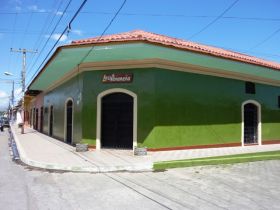

Jet Metier: Is your work translated and consumed by the local Spanish-speaking community?
Darrell Bushnell: Well, I have the translate button on all the web pages but the newsletter is mostly read by the English-speaking community though many readers are Nicas living overseas or people learning English, since I usually write rather simply.
Jet Metier: How did you evolve from working in corporate America to being the voice and reaction of English-speaking Grenada and Nicaragua, through your community newsletter “Nica Nuggets?”
Darrell Bushnell: Not sure why I started writing here, since all my previous writings were corporate reports and studies. Nicaragua does that to you. You reinvent yourself here; the cost of living allows this to happen. It started with the daily dairies, then to the big website, then to the community newsletter. Remember, many of the articles are gleaned from other sources, blogs and forums.
A better example of reinvention is Amy. She was a realtor most of her life but took painting classes after work. Down here she found she was a good and knowledgeable art teacher, so she started the studio/gallery with no prior experience. While not making much more than expenses, she truly enjoys it and has created many new artists from expats, tourists and locals. Who would have thunk?
Jet Metier: Please make a compilation of your essays and you and your wife’s experiences. I would love to read it and review it..jpg)
.jpg)
Darrell, Best Places really wants to get the word out, what great reading your newsletter is. First of all, it looks good; the choice of pictures just cracks me up, e.g., the story about “[car] emissions” and you have a picture of the backside of a herd of oxen. And the writing never seems to be of a "flack", and is written to capture your interest immediately. And even if you do not have the ability to join your musical events or children fun runs, if you were in town that weekend, that is what you would join because of the way you write.
Darrell Bushnell: Some friends are pressuring me to take the diaries and publish as a book on Kindle. Might do it.
Soooo... who are you?
Jet Metier: I interview the most interesting people on the Best Places site, so people will visit my interviewees’ businesses and organizations such as non-profits. And I am also a fan of your site, Nica Nuggests and the people and places you put to light. So this interview will be edited and put under "Stories” and in your profile summary, so all the readers of Best Places will get to know you better.
My last posted interview was The Secret Love Life of Dolphins and Whales with Anne Gordon de Barragon.
Darrell Bushnell: Hmmmm.... interesting story. I may link it on my next newsletter.
Jet Metier: Thanks. Anne, like so many expats, is living a life that others only dream of, and she is contributing to the understanding of animals that so many love..JPG)
.JPG)
As an aside, I would really enjoy a children's book by you about a farm boy who dreams of rocket ships and space travel and lands on a planet like Nicaragua, where he uses his humor and good sense to get by.
Darrell Bushnell: Good idea, though my projects are taking a lot of time.
A major project we are starting with the US Embassy here is to create a network of NGOs [Non-Governmental Organization; usually a type of non-profit] to allow them to be aware of each other, share knowledge and experiences and hopefully begin sharing resources. For example, it is easier to ship 50,000 books here all at once than to have each org ship 100 books at a time.
Jet Metier: Good idea. I hope it all works out.
As for the Best Places community, I wonder if I am serving them well. I think of your personal anecdotes that make me laugh. I want people to read this article and laugh like I did when you asked for aid after the last earthquake in the form of gourmet licorice, or when that woman who called you and complained of her wall falling that you had nothing to do with, or your solution to the loud noise of the giant parade characters and the boys who play drums next to them.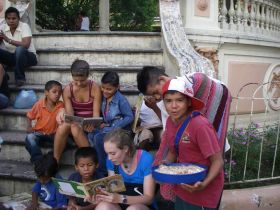

Darrell Bushnell: If you like anecdotes, be sure to read the "Dead Dog Sting" on Nicaragua Guide-The Nica Sagas, my personal favorite.
A general comment on new expats. When we first arrived, the first expats were very independent, living on what they had and just surviving. Kind of like the menfolk first going to California in the 1800s. Now the womenfolk and children in the Conestoga wagons are moving to California to meet up with the men. Hmmmm... that sounds a little sexist. Anyway, the newcomers are very different and are expecting a little nicer life.
Jet Metier: And just like the Old West, the women want sidewalks and ice cream parlors and a general store with candy for the kids and bolts of pretty calico for their Sunday-go-to-meeting dresses. But in Granada, I see from your site, they want and get modern gyms, vegetarian food and group excursions to picturesque villages.
I imagine that when people come to town and they hear about you, they want to take you out for a drink and pick your brain. Everyone knows how valuable you are.
Darrell Bushnell: Yes, you are right that many people ask to meet us to pick our brains, but that again, is because we have no irons in the fire and they seem to trust us. We always warn them that these are only our opinions.
Jet Metier: Oh, I did so want to hear something not published. Met any interesting expats lately, other slices of life that have another angle that you have not covered on your site?
Darrell Bushnell: No anecdotes, but as I sit here writing to you in another country, vendors come to my door selling everything from fruits and vegetables to brooms and mops to freshly caught shrimp and fish. Since most people can't afford the local newspaper (US$.30), a vehicle goes by with loudspeakers announcing local news such as the obituaries, upcoming events and sales. Since phones are almost free, everyone has a phone, but not having any minutes, they use them to text each other and play the electronic games on them. Soon the tablet PCs will be almost free. Then there will be an information explosion here since that will bring books, news, Facebook, etc. to everyone.
Jet Metier: Ah! That are the nuggets (Nica-style) that I find fascinating. You are sitting in the front seat of an incredible and somewhat rare overseas experience.
I am sure that people would love to visit your wife's artist studio and take classes from her. What is the name of her storefront?.JPG)
.JPG)
Darrell Bushnell: Amy's website is nicaragua-art and her art studio and gallery is La Calzada Centro de Arte on FB, nicaragua-community is the website for Nica Nuggets Community News, Nicaragua-guide is for Nicaraguan expats and those thinking about becoming one and Puedo Leer is our reading and library foundation.
We support many orgs here directly or indirectly. It is hard to believe what many of the expats are doing for the community here. Well, besides Puedo Leer, there are those run by friends, which include Education Plus, La Esperanza, El Puente, Neighbors to Nicaragua and many more. There are over 3,000 NGOs in Nicaragua and hence, the need for the NGO network.
Amy and I are a very small piece of what many people are doing for Nicaragua. Let me think about that some more.
Perhaps you need to add that to your topics on the Best Places site since many people contact me regarding volunteer activities that are available, or even where they can work fulltime.
Jet Metier: We do have questions for on the Best Places site regarding volunteer work. Take a look at this answer from Mike Cobb of Gran Pacifica under the question “What are the best opportunities to do volunteer work and charity in Nicaragua?”
However, we don't have a message board for work, but companies can certainly post those inquiries on their marketplace listing when they have a need.
Here’s some final questions: if there was a big earthquake would you shelter in place or head back to the US; is there a grand plan at this stage in your life; and how do you want that final chapters to read?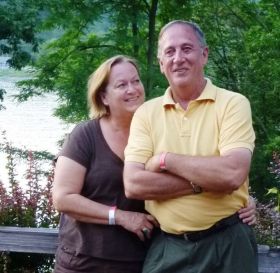

Darrell Bushnell: No, we would never go back to the states. We would die of boredom. Other countries are a possibility, but not likely. We enjoy being bigger frogs in a smaller pond than the alternative.
Since this is a place for reinvention, we don't know what the final chapter would be. At a certain age, when all has been said or done, we would like to think we would just jump into a volcano together leaving behind a small plaque that states this is where Amy and Darrell started the next phase. Of course, Amy keeps reminding me she is six years younger so she would be getting the wrong end of the stick.
I am not a spring chicken so eventually no one will pay attention to our musings, since who listens to people who are over 70? I have six years to accomplish a lot.
Jet Metier: I am holding my belly laughing, Darrell. Later on I am going to write comments into your newsletter because I really want to support what you do. Darrell, with this interview, I have only scratched the surface of what our readers would enjoy reading about you and your life as an expat in Nicaragua. Keep telling your stories, continue with the good work that is admired and must be emulated. I hope anyone who can, drops by Amy's shop and school.
And remember, everyone, Darrell and Amy like gourmet licorice, but I hear that Twizzlers will do. Thank you, Darrell. Let's keep in touch.
Good bye for now.
Darrell Bushnell: OK, adios. It was enjoyable, but now I need a siesta.

Jet continues her interview in Part Two and finds out what exactly Darrell means by “Elf” in his job description on his signature block and how the dogs' comfort factors into selecting the Bushnell's new home.


